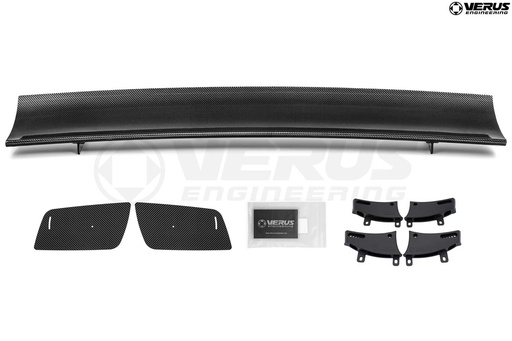UCW Rear Wing Kit - Porsche 991 GT3 (BLEMISH)







OVERVIEW
*The pictures provided above are not the blemished product. Blemish products have small defects on the surface finish or carbon but are structurally sound.*
The UCW rear wing is a great addition to your 991 GT3 to increase downforce significantly in the rear, increase confidence on track, and reduce lap times.
Verus Engineering developed the UCW rear wing to bridge the gap between our swan neck high-efficiency rear wing and our 300mm V1X airfoil. With the 250mm curved chord, the UCW makes more downforce than the high-efficiency rear wing and significantly more downforce than similarly sized competitor wings.
Utilizing state-of-the-art analysis software during the R&D process, we optimized the airfoil for performance for the given build volume which is derived from the V1X. Further utilizing CFD, we ensured the rear wing sees adequate airflow while installed and performs well.
During the design process; we utilized in-house scan data. This results in a product that features a near OEM fit and finish.
The UCW wing is the perfect addition to the track goer who requires a large bump in rear downforce to balance out a significant front aero package.
UCW Wings are assembled per order and will ship within 5 business days from receipt of order.
WHAT IS INCLUDED
- Carbon Rear Wing Element, 250mm Chord
- Carbon Endplate (2)
- Machined Aluminum Wing Mount (2)
- Machined Aluminum Wing Upright (4)
- Hardware Kit, Includes All Hardware Necessary for Install
FEATURES
Optimized Airfoil Using ANSYS Adjoint Solver
Improved Efficiency (L/D)
Increased Downforce
Bolts to OEM Trunk In Place of OEM Unit
Capable of Generating and Withstanding 500+lbs of Downforce
Capable of Balancing Out Significant Front Aerodynamic Systems
SPECIFICATIONS
Carbon Fiber Rear Wing - 2x2 Twill Pre-preg carbon, Autoclave Cured, Automotive High-Gloss Clear
Machined Billet Aluminum Uprights
Machined Billet Aluminum Trunk Mounts
Stainless Hardware Throughout
SCIENCE
The Verus Engineering UCW Rear Wing was specifically designed for the 991 GT3 enthusiast who wants more rear-end downforce. The wing has the capability of operating and generating downforce from 0 to 15 degrees angle of attack. As part of our Ventus 3 aerodynamic kit, the rear wing, and aero kit adds a significant amount of downforce to the car to help reduce lap times and increase corner speed.
Our CFD data and our real-world experimental data match up quite well. The wing hit all the major goals we set forth to achieve first in our CFD simulations and then with our real-world testing. The strong correlation between CFD data and real-world testing validates both our CFD analysis approach and the wing’s performance.




















